#NNPA BlackPress
Sarah H. Johnson Rose Above the Times in Greenville, MS
THE NEW TRI-STATE DEFENDER — Excerpt: Greenville Mayor Errick D. Simmons released a statement, expressing the city’s shock and sadness shortly after Johnson’s death. Simmons said hearts were heavy in Greenville for the loss of Mrs. Johnson. “Mrs. Johnson will be remembered, not only as a municipal leader, but also as a community activist who loved the City of Greenville, her family, and all its citizens,” Simmons wrote. “Mrs. Johnson’s determination, dedicated service, and courage opened the doors of City Hall for me and every other Black municipal leader in Greenville.”
The post Sarah H. Johnson Rose Above the Times in Greenville, MS first appeared on BlackPressUSA.
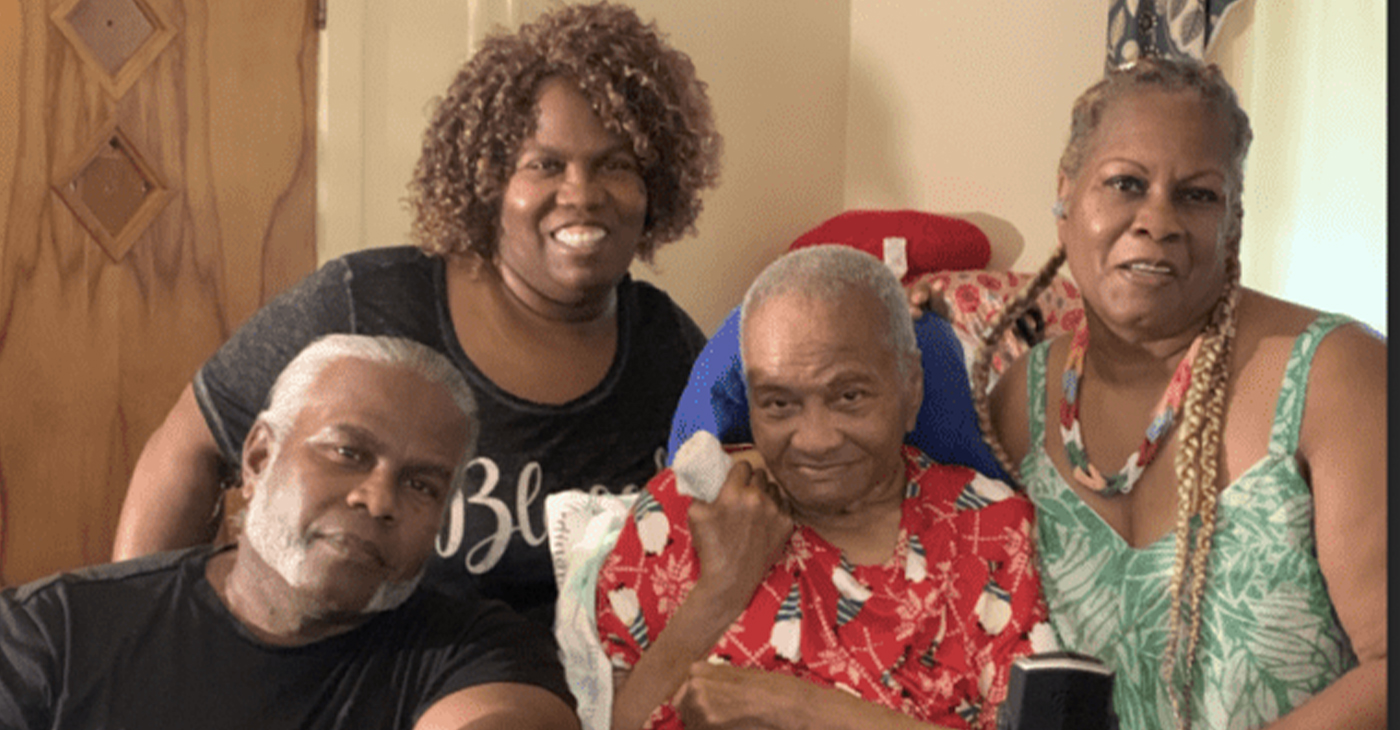
By Sybil C. Mitchell | The New Tri-State Defender
Sarah Hughes Johnson, a beloved daughter of Greenville, Mississippi, respected for her Civil Rights advocacy and civic leadership, died May 9 at Region One Health in Memphis. She was 85.
Ms. Johnson’s life was a filled with accomplishments that helped improve the lives of her constituents, especially African Americans.
“Our mother was bold,” said Geneva Johnson, the eldest of Johnson’s four children. “She was courageous, and threats from white people who didn’t like what she was doing never fazed her. Mother just kept going, even after the divorce when she was left to raise four children alone. She was never distracted from her purpose.”
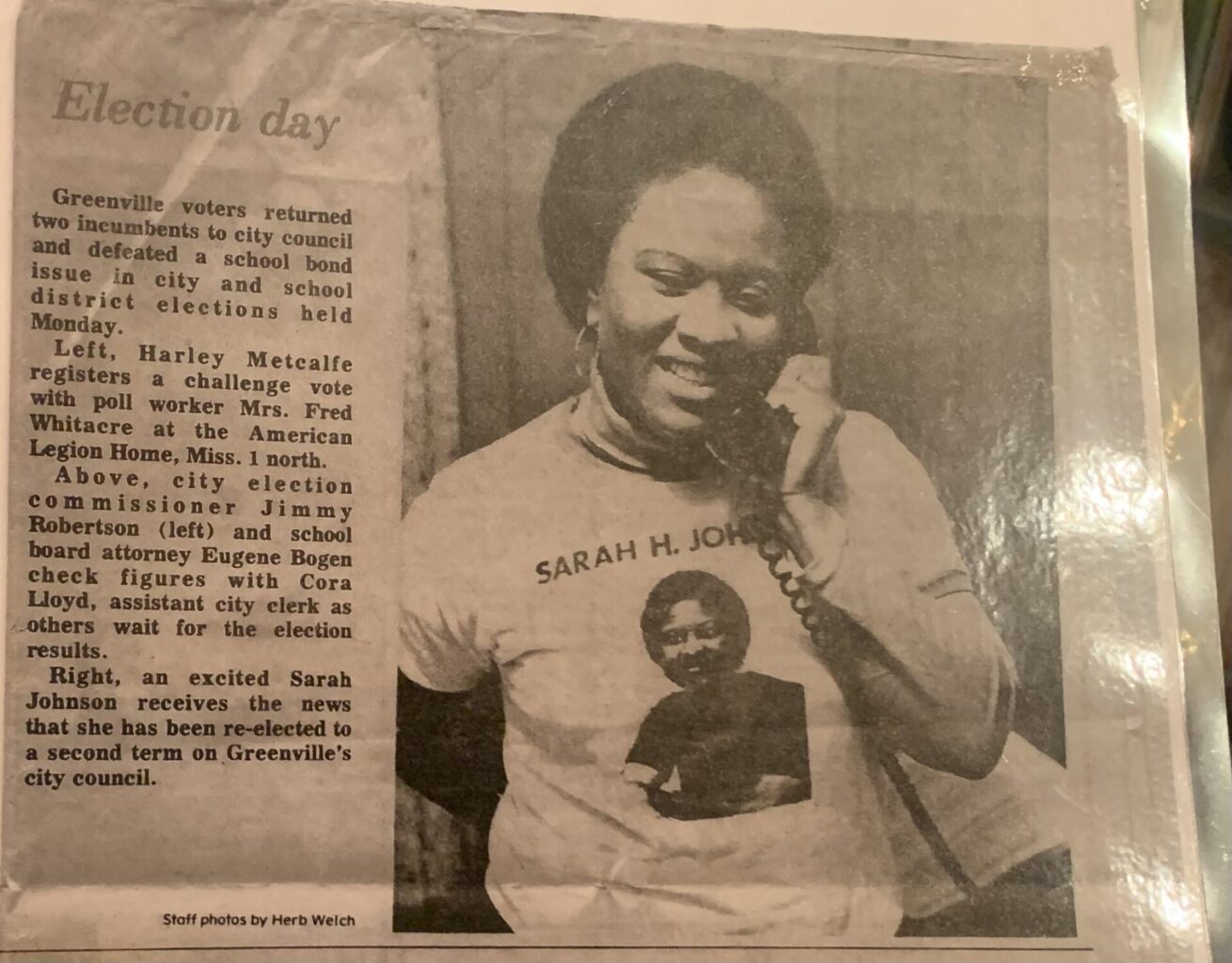
Sarah Hughes Johnson handled her business and won reelection.
In 1973, Ms. Johnson became the first African American to serve on the Greenville City Council. Johnson was also the city’s vice-mayor.
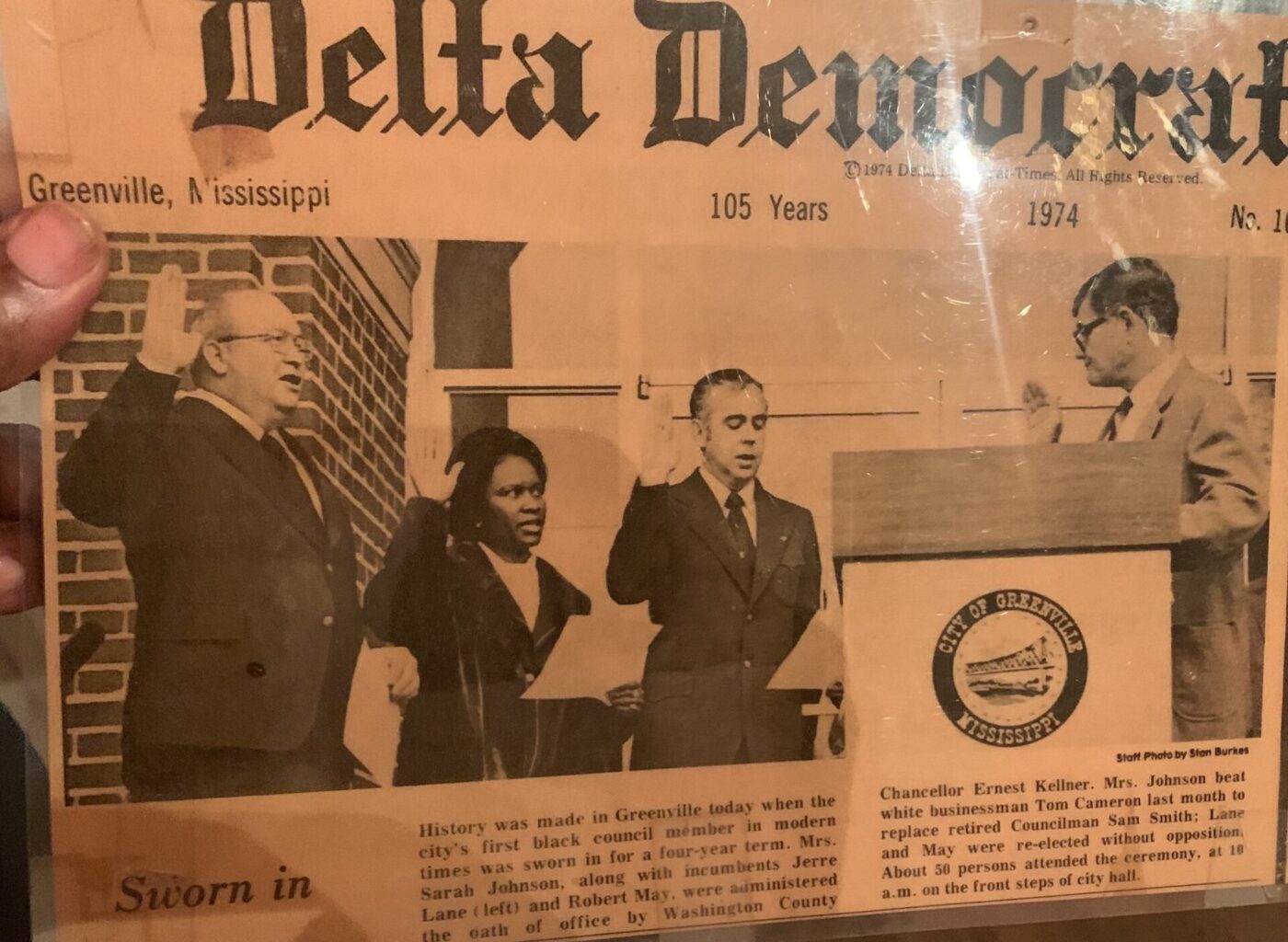
Sarah Hughes Johnson’s swearing-in ceremony was front-page news.
Ms. Johnson served on the city council for 23 years. Upon retiring in 1996, she realized that she helped push the city forward for more than two decades.
Beyond Greenville’s racist past, her efforts spurred momentum for a new day in uniting the races in hope and optimism.
“Of course, as children, we didn’t understand, really, who our mother was,” said Karen Johnson, youngest of the four children. Mother was director of various organizations. She had lots of friends also working in the civil rights movement.
“We had different ‘nannies,’ who would look after us. We didn’t see mother as much as we would have liked, especially me because I’m the baby. But we at least could understand that her work was important.”
In 2013, then-Greenville mayor John Cox met Johnson, along with family members and officially renamed a Greenville street, “Sarah H. Johnson Lane.”
Even at 75, sitting in her wheelchair, Johnson made a speech during the event.
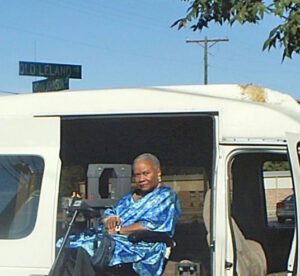
Sarah Hughes Johnson (2010) at the intersection of Old Leland and the street named after her. (Courtesy photo)
“Praise God and thank you, Jesus,” she began. “I want to thank all of you for coming out to this occasion…”
The Delta Daily News reported that Ms. “Johnson won her political campaign in 1973 during a time when racism and Jim Crow laws were still in full effect despite being revoked years prior…”
“Throughout her career, Johnson was known for her tenacity and willingness to help the poor, middle-class, and the elderly. Her goal was always to help those who were less fortunate. She will be remembered for embodying the characteristics that the community needs to see in its leaders.”
Greenville Mayor Errick D. Simmons released a statement, expressing the city’s shock and sadness shortly after Johnson’s death. Simmons said hearts were heavy in Greenville for the loss of “Mrs. Johnson.”
“Mrs. Johnson will be remembered, not only as a municipal leader, but also as a community activist who loved the City of Greenville, her family, and all its citizens,” Simmons wrote. “Mrs. Johnson’s determination, dedicated service, and courage opened the doors of City Hall for me and every other Black municipal leader in Greenville.”
Johnson was employed by Mississippi Action for Community Education, where she was the area director for the People’s Education Program (Head Start). Johnson also served as a 1972 Fellow of the Mississippi Institute of Politics and attended several affairs by invitation to the White House during President Jimmy Carter’s administration.
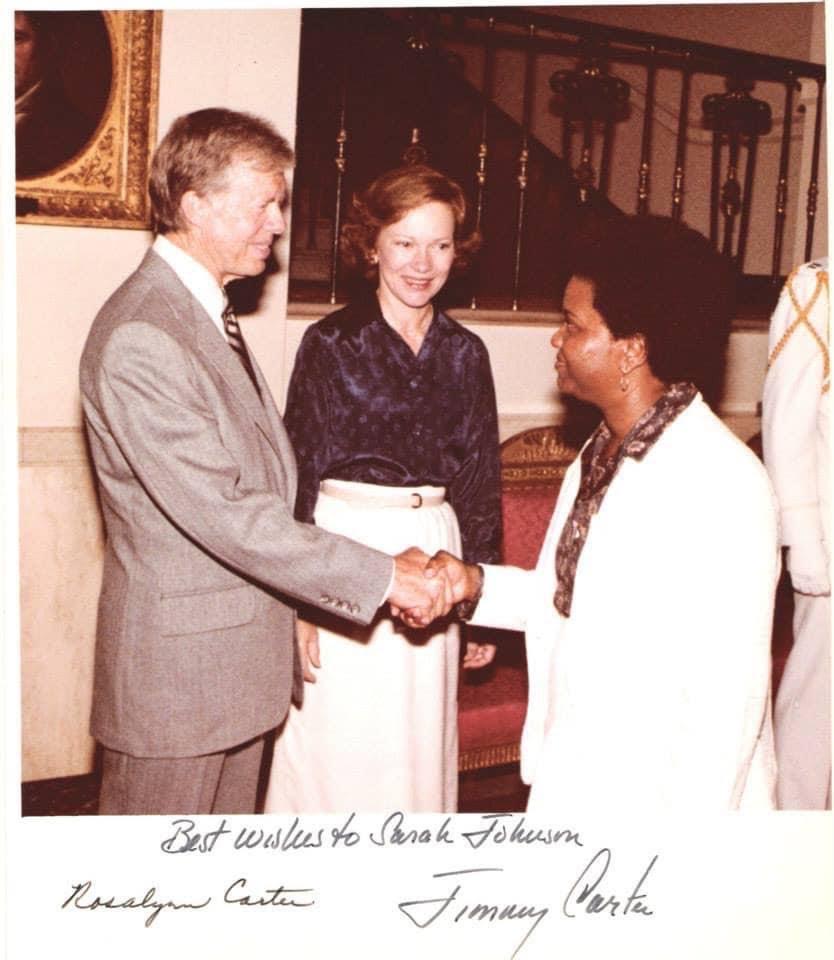
Sarah Hughes Johnson is greeted by President Jimmy Carter and his wife, Rosalyn. (Courtesy photo)
Sarah Hughes was the fourth child of 13 children. she never knew who her father was. Her birth mother gave her to an aunt, who had just lost a baby.
“There was never a formal adoption, or anything like that,” said Geneva Johnson. “My mom’s birth mother gave her sister the baby because her baby died. So really, the woman my mother called her mother was really her auntie. That’s just what families did back then.
“She was born in Allendale, South Carolina. Mother and Daddy came later to Greenville because he was moved to a new church. Dad was a United Methodist pastor.”
Sarah Hughes met Ned Johnson at Clark College. She was a first-year student, and Ned Johnson was attending Gammon Seminary. Although Hughes won a full-time scholarship as valedictorian of her high school, she left after her freshman year. After starting a family, Johnson was assigned a new church in Greenville.
Unfortunately, the union did not last, and Ned Johnson left Greenville, never to return.
“My dad left when I was three years old,” said Karen Johnson. “But my mother was always there — still out there fighting for her community. Mother and other community activists decided that the four Johnson children will go to the predominantly white school to force integration.
“And I didn’t mind going to school with white children. It was just not having the frilly, little dresses that bothered me. I was about six or seven.”
Despite a very painful divorce and all the hatred the white establishment could muster, Johnson never lost sight of her vision that all of Greenville’s children would enjoy a free, public, and equal education and every citizen could freely exercise their right to vote without threat or intimidation.

Sarah Hughes Johnson in earlier times with her children (l-r) Geneva, Ned, Yvonne and Karen. (Courtesy photo)
“This Mother’s Day was going to be extra special,” said Geneva Johnson, prior to the holiday. “Each year, that day becomes so precious because you begin to realize your mother won’t be with you always. I thought we would enjoy her today. She went on to be with the Lord, but we’re still going to enjoy her.
“We’ll share memories and laugh about so many things we thought were funny as children. We’ll call our brother Ned so we can all remember her together. It will be hard, but we will get through it. We are all pretty tough. We got it from our mother.”
This article originally appeared in the New Tri-State Defender
The post Sarah H. Johnson Rose Above the Times in Greenville, MS first appeared on BlackPressUSA.
#NNPA BlackPress
IN MEMORIAM: Ramona Edelin, Influential Activist and Education Advocate, Dies at 78
NNPA NEWSWIRE — Born on September 4, 1945, in Los Angeles, California, activist Ramona Edelin’s early years were marked by a commitment to education and social justice. According to her HistoryMakers biography, after graduating from Fisk University with a Bachelor’s degree in 1967, she pursued further studies at the University of East Anglia in England. She earned her master’s degree before completing her Ph.D. at Boston University in 1981.
The post IN MEMORIAM: Ramona Edelin, Influential Activist and Education Advocate, Dies at 78 first appeared on BlackPressUSA.

By Stacy M. Brown, NNPA Newswire Senior National Correspondent
@StacyBrownMedia
Once upon a time, Black Americans were simply known as colored people, or Negroes. That is until Ramona Edelin came along. The activist, renowned for her pivotal roles in advancing civil rights, education reform, and community empowerment, died at her D.C. residence last month at the age of 78. Her death, finally confirmed this week by Barnaby Towns, a communications strategist who collaborated with Dr. Edelin, was attributed to cancer.
Born on September 4, 1945, in Los Angeles, California, Edelin’s early years were marked by a commitment to education and social justice. According to her HistoryMakers biography, after graduating from Fisk University with a Bachelor’s degree in 1967, she pursued further studies at the University of East Anglia in England. She earned her master’s degree before completing her Ph.D. at Boston University in 1981.
Edelin’s contributions to academia and activism were manifold. She was pivotal in popularizing the term “African American” alongside Rev. Jesse L. Jackson in the late 1980s.
Jackson had announced the preference for “African American,” speaking for summit organizers that included Dr. Edelin. “Just as we were called Colored, but were not that, and then Negro, but not that, to be called Black is just as baseless,” he said, adding that “African American” “has cultural integrity” and “puts us in our proper historical context.”
Later, Edelin told Ebony magazine, “Calling ourselves African Americans is the first step in the cultural offensive,” while linking the name change to a “cultural renaissance” in which Black Americans reconnected with their history and heritage.
“Who are we if we don’t acknowledge our motherland?” she asked later. “When a child in a ghetto calls himself African American, immediately he’s international. You’ve taken him from the ghetto and put him on the globe.”
The HistoryMakers bio noted that Edelin’s academic pursuits led her to found and chair the Department of African American Studies at Northeastern University, where she established herself as a leading voice.
Transitioning from academia to advocacy, Edelin joined the National Urban Coalition in 1977, eventually ascending to president and CEO. During her tenure, she spearheaded initiatives such as the “Say Yes to a Youngster’s Future” program, which provided crucial support in math, science, and technology to youth and teachers of color in urban areas. Her biography noted that Edelin’s efforts extended nationwide through partnerships with organizations like the National Science Foundation and the United States Department of Education.
President Bill Clinton recognized Edelin’s expertise by appointing her to the Presidential Board on Historically Black Colleges and Universities in 1998. She also co-founded and served as treasurer of the Black Leadership Forum, solidifying her standing as a respected leader in African American communities.
Beyond her professional achievements, Edelin dedicated herself to numerous boards and committees, including chairing the District of Columbia Educational Goals 2000 Panel and contributing to the Federal Advisory Committee for the Black Community Crusade for Children.
Throughout her life, Edelin received widespread recognition for her contributions. Ebony magazine honored her as one of the 100 Most Influential Black Americans, and she received prestigious awards such as the Southern Christian Leadership Award for Progressive Leadership and the IBM Community Executive Program Award.
The post IN MEMORIAM: Ramona Edelin, Influential Activist and Education Advocate, Dies at 78 first appeared on BlackPressUSA.
#NNPA BlackPress
Tennessee State University Board Disbanded by MAGA Loyalists as Assault on DE&I Continues
NNPA NEWSWIRE — Recent legislative actions in Tennessee, such as repealing police reform measures enacted after the killing of Tyre Nichols, underscore a troubling trend of undermining local control and perpetuating racist agendas. The new law preventing local governments from restricting police officers’ authority disregards community efforts to address systemic issues of police violence and racial profiling.
The post Tennessee State University Board Disbanded by MAGA Loyalists as Assault on DE&I Continues first appeared on BlackPressUSA.

By Stacy M. Brown, NNPA Newswire Senior National Correspondent
@StacyBrownMedia
Tennessee State University (TSU), the state’s only public historically Black college and university (HBCU), faces a tumultuous future as Gov. Bill Lee dissolved its board, a move supported by racist conservatives and MAGA Republicans in the Tennessee General Assembly, who follow the lead of the twice-impeached, four-times indicted, alleged sexual predator former President Donald Trump. Educators and others have denounced the move as an attack on diversity, equity, and inclusion (DE&I) and a grave setback for higher education.
Critics argue that TSU’s purported financial mismanagement is a manufactured crisis rooted in decades of underinvestment by the state government. They’ve noted that it continues a trend by conservatives and the racist MAGA movement to eliminate opportunities for Blacks in education, corporate America, and the public sector.
Gevin Reynolds, a former speechwriter for Vice President Kamala Harris, emphasizes in an op-ed that TSU’s financial difficulties are not the result of university leadership because a recent audit found no evidence of fraud or malfeasance.
Reynolds noted that the disbanding of TSU’s board is not an isolated incident but part of a broader assault on DE&I initiatives nationwide. Ten states, including Tennessee, have enacted laws banning DE&I policies on college campuses, while governors appointing MAGA loyalists to university trustee positions further undermine efforts to promote inclusivity and equality.
Moreover, recent legislative actions in Tennessee, such as repealing police reform measures enacted after the killing of Tyre Nichols, underscore a troubling trend of undermining local control and perpetuating racist agendas. The new law preventing local governments from restricting police officers’ authority disregards community efforts to address systemic issues of police violence and racial profiling.
The actions echo historical efforts to suppress Black progress, reminiscent of the violent backlash against gains made during the Reconstruction era. President Joe Biden warned during an appearance in New York last month that Trump desires to bring the nation back to the 18th and 19th centuries – in other words, to see, among other things, African Americans back in the chains of slavery, women subservient to men without any say over their bodies, and all voting rights restricted to white men.
The parallels are stark, with white supremacist ideologies used to justify attacks on Black institutions and disenfranchise marginalized communities, Reynolds argued.
In response to these challenges, advocates stress the urgency of collective action to defend democracy and combat systemic racism. Understanding that attacks on institutions like TSU are symptomatic of broader threats to democratic norms, they call for increased civic engagement and voting at all levels of government.
The actions of people dedicated to upholding the principles of inclusivity, equity, and justice for all will determine the outcome of the ongoing fight for democracy, Reynolds noted. “We are in a war for our democracy, one whose outcome will be determined by every line on every ballot at every precinct,” he stated.
The post Tennessee State University Board Disbanded by MAGA Loyalists as Assault on DE&I Continues first appeared on BlackPressUSA.
#NNPA BlackPress
Braxton Haulcy and the Expansion of Walker|West Music Academy
May 24, 2023 – Walker West Music Academy gets an early start on expansion. Join us for a Wednesday episode of The …
The post Braxton Haulcy and the Expansion of Walker|West Music Academy first appeared on BlackPressUSA.

May 24, 2023 – Walker West Music Academy gets an early start on expansion. Join us for a Wednesday episode of The …
The post Braxton Haulcy and the Expansion of Walker|West Music Academy first appeared on BlackPressUSA.
-

 Activism4 weeks ago
Activism4 weeks agoOakland Post: Week of March 27 – April 2, 2024
-

 #NNPA BlackPress4 weeks ago
#NNPA BlackPress4 weeks agoBeloved Actor and Activist Louis Cameron Gossett Jr. Dies at 87
-

 Community2 weeks ago
Community2 weeks agoFinancial Assistance Bill for Descendants of Enslaved Persons to Help Them Purchase, Own, or Maintain a Home
-

 Activism3 weeks ago
Activism3 weeks agoOakland Post: Week of April 3 – 6, 2024
-

 Business2 weeks ago
Business2 weeks agoV.P. Kamala Harris: Americans With Criminal Records Will Soon Be Eligible for SBA Loans
-

 Activism2 weeks ago
Activism2 weeks agoOakland Post: Week of April 10 – 16, 2024
-

 Community2 weeks ago
Community2 weeks agoAG Bonta Says Oakland School Leaders Should Comply with State Laws to Avoid ‘Disparate Harm’ When Closing or Merging Schools
-

 Community1 week ago
Community1 week agoOakland WNBA Player to be Inducted Into Hall of Fame






















































